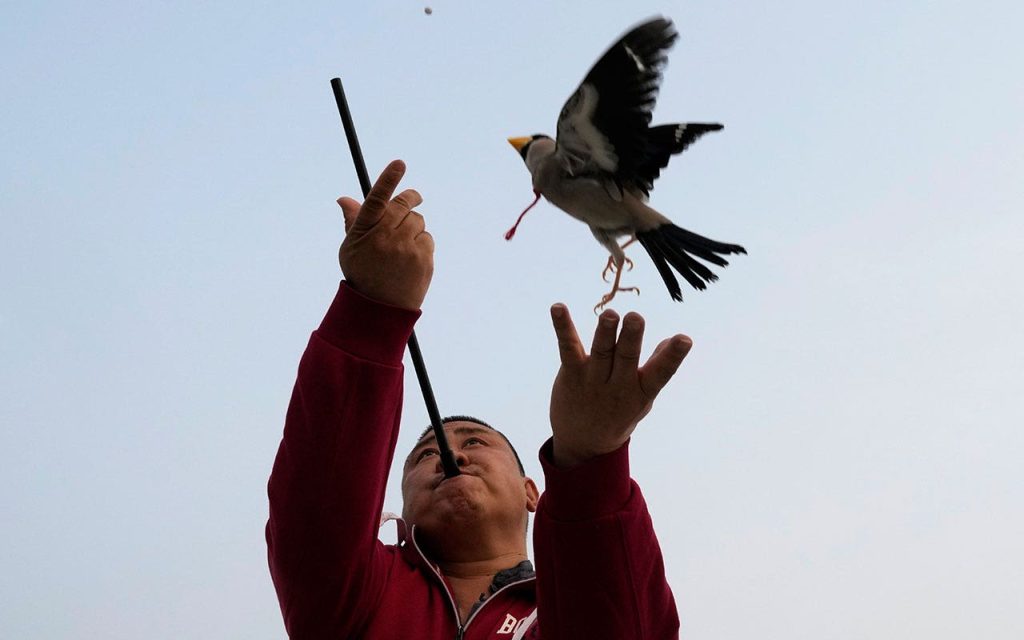During the winter or early spring in Beijing, a tradition dating back to the Qing Dynasty is still practiced by around 50 to 60 residents of the city. This tradition involves playing fetch with birds, specifically the migratory wutong species, using plastic beads blown into the air through carbon tubes. The birds catch the beads and return them in exchange for a treat. Xie Yufeng, a 39-year-old cook, is one of the residents who still engage in this tradition, gathering with friends near Workers’ Stadium to play fetch with their winged companions. It takes several months to domesticate and train the birds for this game, starting with throwing seeds into the air and gradually replacing them with plastic beads. The tradition is said to have originated with the arrival of the Qing Dynasty in Beijing, with Manchu nobles popularizing bird-catching and training as a pastime.
The wutong birds, with their distinctive yellow beaks, migrate southward from China’s northeast to Beijing every fall to escape the harsh winter. Residents of Beijing’s traditional hutongs, or alleyways, often raise these birds in cages and take them for walks, releasing them in late spring to migrate back to the northeast and purchasing new ones in the fall. The training process for these birds requires patience and dedication, as they are rewarded with snacks every time they successfully retrieve the beads. Originally, the beads used for this game were made of bone, but today, plastic beads are more commonly used. The tradition of playing fetch with birds has been passed down through generations in Beijing, with Xie and his friends continuing to keep it alive in modern times.
Passersby in Beijing may come across groups of residents playing fetch with birds during the winter or early spring, particularly near Workers’ Stadium where residents often gather in the evenings for various activities. The practice of playing fetch with birds has a long history in Beijing, dating back to the Qing Dynasty which ruled the city from the 17th to the early 20th century. Although this tradition is not as common as it once was, with only a small number of people still practicing it today, it remains an important cultural practice in the city. The skill and patience required to train the birds for this game highlight the dedication of those who continue to uphold this tradition in modern Beijing.
For Xie and his friends, playing fetch with birds is not just a pastime, but a way to connect with nature and carry on a centuries-old tradition. The process of domesticating and training the wutong birds for this game takes time and effort, but the rewards of seeing the birds catch and return the plastic beads are worth it. The significance of birds as symbols of wisdom and the connection to nature is an important aspect of this tradition, passed down from the Manchu nobles of the Qing Dynasty who popularized bird-catching and training as a leisure activity in Beijing. As residents of Beijing’s hutongs continue to raise and train birds for this game, the tradition lives on as a unique cultural practice in the city, showcasing the bond between humans and nature that has endured for centuries.
In conclusion, the tradition of playing fetch with birds in Beijing is a special cultural practice that has been carried on for centuries, dating back to the Qing Dynasty. The patience and dedication required to train the wutong birds for this game reflect the commitment of those who continue to practice this tradition in modern times. The birds, with their distinctive yellow beaks, migrate from China’s northeast to Beijing every fall, where residents of the city’s traditional hutongs raise them in cages and release them in the spring to migrate back. By engaging in this ancient tradition, residents like Xie and his friends are not only connecting with nature but also preserving a piece of Beijing’s cultural heritage for future generations to appreciate and enjoy.


